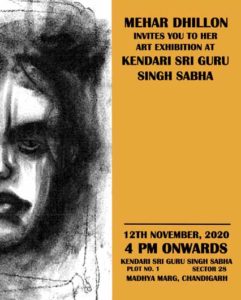Young artist chalks out the “Bars of Rage”
Sketching her mind on paper since the age of four, Mehar Dhillon is possessed by the drive to construct infinite universes within the limited confines of a blank page or canvas. This drive stems from the need to understand and connect. She pays careful attention to how people interact with themselves and their surroundings. Through her works, she engages to decipher the universality contained within our unique experiences, and in trying to understand others, understand oneself. The World Sikh News presents one of her primary paintings which received accolades at a recently organised exhibition of the paintings by the young artist.
![Sketching her mind on paper since the age of four, Mehar Dhillon is possessed by the drive to construct infinite universes within the limited confines of a blank page or canvas. This drive stems from the need to understand and connect. She pays careful attention to how people interact with themselves and their surroundings. Through her works, she engages to decipher the universality contained within our unique experiences, and in trying to understand others, understand oneself. The World Sikh News […]](https://www.theworldsikhnews.com/wp-content/uploads/2021/01/charcol-painting-360x266.jpg)
:It was raining. The much-awaited monsoon had finally arrived in Punjab, drenching the parched earth with water. I lay on the living room couch reading Maya Angelou’s poem, ‘I know why the caged bird sings’. Sometimes rain lashed at the glass panes angrily and sometimes fell melodiously on the roof. Angelou, a victim of child abuse, had poured forth the pain and anger in the poem. These were the lines that inspired the charcoal art piece which is the main photo of this piece:
But a bird that stalks
down his narrow cage
can seldom see through|
his bars of rage
his wings are clipped and
his feet are tied
so he opens his throat to sing.
-Maya Angelou
Traumatic events remain with us for a lifetime, the residual effect is felt even by the generations that follow. Injustice breeds a very specific kind of anger, one of resentment, betrayal, and incomprehensible hurt. The victims are helpless to this anger that slowly corrodes their being. They remain trapped behind the ‘ bars of rage’, struggling to break free.
The intense anger, if not given a meaningful outlet, manifests in an altered emotional response. It is very important to deal with rage to live a meaningful and peaceful life. If left unattended, the trauma continues to haunt generations.
The charcoal piece- Bars of Rage, aims to express the rage felt after an act of violence.
For me, art has to be universal, relatable, and cathartic. It is not limited to an individual, it is the voice of humanity. Art to me is human, a narrative, and a deep dive into the human condition.
I selected the charcoal medium to show the depth of the darkness that a person is thrown into. Sometimes, playing with two extremely opposite colours can transform a piece of art. They can make it more intense and forceful.
 Art for me is a powerful tool that can usher social and cultural change. It can gradually shift the way the world views and addresses issues especially those concerning women. Through this piece, I tried to draw people’s attention and sensitize them regarding the aftermath of domestic violence and make them aware of the pain and rage the victim silently suffers.
Art for me is a powerful tool that can usher social and cultural change. It can gradually shift the way the world views and addresses issues especially those concerning women. Through this piece, I tried to draw people’s attention and sensitize them regarding the aftermath of domestic violence and make them aware of the pain and rage the victim silently suffers.
When it was put up for an exhibition, it triggered a discussion among the audience. The men and women, young and old shared their stories or the tales of the trauma they had heard.
For some of the members of the Sikh community-the community, I belong to-it brought to surface the scars of the ‘84 Sikh genocide. That day I felt that trauma does not always affect families, it can affect communities too.
For some of the members of the Sikh community-the community, I belong to-it brought to surface the scars of the ‘84 Sikh genocide. That day I felt that trauma does not always affect families, it can affect communities too.
For me, art has to be universal, relatable, and cathartic. It is not limited to an individual, it is the voice of humanity. Art to me is human, a narrative, and a deep dive into the human condition.

3 thoughts on “Young artist chalks out the “Bars of Rage””